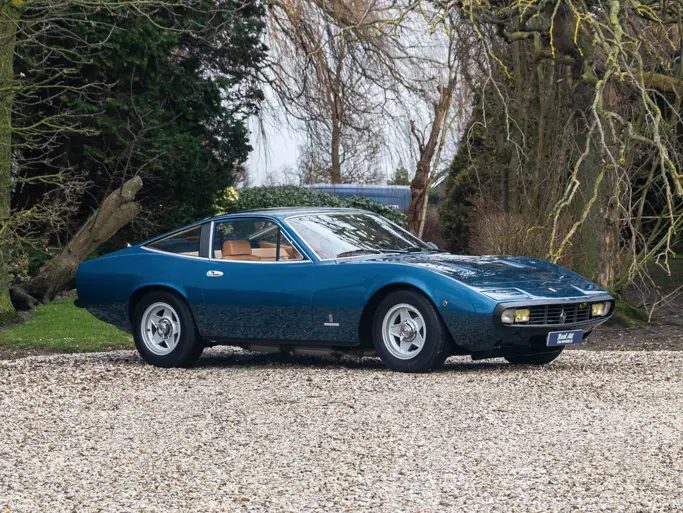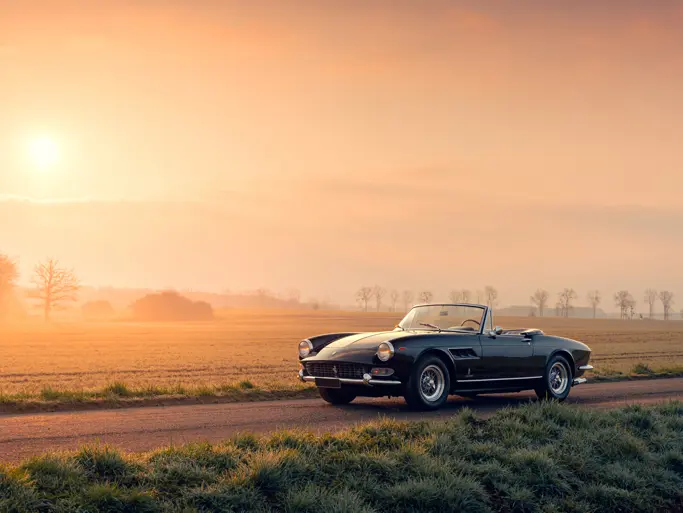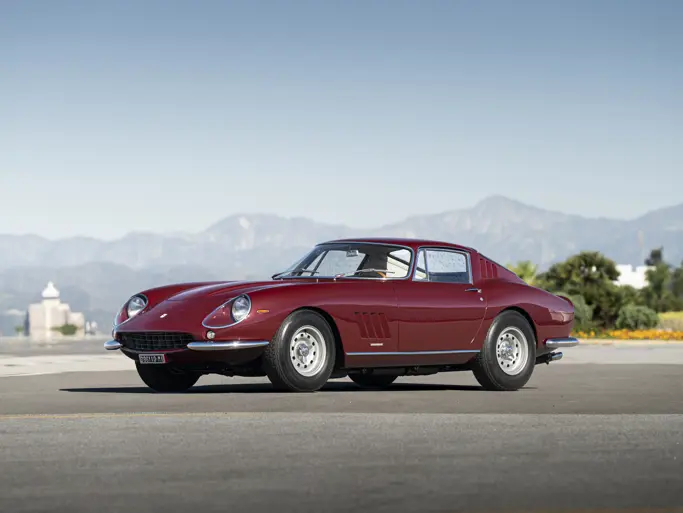300 bhp, 3,967 cc SOHC V-12 engine with three Weber carburetors, four-speed manual transmission, independent front suspension with coil springs, live axle rear suspension with semi-elliptic leaf springs, and four-wheel disc brakes. Wheelbase: 104.2 in.
Replacing the 250 GTE 2+2 and the limited-production 330 America was the Ferrari 330 GT 2+2, which made its first public appearance at the Brussels Salon in January 1964. This new model helped carry on the success of the 2+2 models of the immediate past with several key updates, in hopes of seeing an increase in sales over the 250 GTE 2+2.
Ferrari’s new four-seater featured a completely new body style from Pininfarina, one that was very distinctive from the other Ferrari models on sale at the time. The easiest way to identify the first-series 330 GT 2+2 is by its quad headlight front end. The Series II cars adapted dual headlights, leaving the Series I as the sole model of the entire 330 GT 2+2 production run to wear quad headlights. Other notable cosmetic changes include more angular nose and tail sections from the 250 GTE 2+2 and the introduction of a wider front grille to help increase airflow to the engine.
Following in the footsteps of the 330 America in terms of its drivetrain, the 330 GT 2+2 featured a four-liter V-12 engine, which was mated to the existing four-speed-plus overdrive transmission in the 250 GTE. Its wheelbase was increased by two inches, and with the installation of Koni adjustable shock absorbers, handling had improved immensely. Before production began on the redesigned Series II, Ferrari had produced 625 examples of the initial series.
The 330 GT 2+2 remains one of Ferrari’s finest four-passenger touring cars. With its 300-horsepower, 4.0-litre engine, it is powerful yet easy to drive around town, while its luxurious appointments make it as ideal for today’s road tours and events as when it was new. As 330-series Ferraris become more desirable to collectors, the 330 GT 2+2 provides an opportunity into Ferrari ownership at a reasonable price. The car’s Rosso paintwork suits a 2+2 Ferrari such as this, while also showing off the distinctive shape of the Series I. This car will surely prove to be a fantastic driver, as it can easily accommodate a family of four on brief outings, which is something rare in the world of Enzo era Ferraris.
The first-series example offered today, chassis 6561 GT, was produced in December 1964 and delivered in the spring of 1965 to Luigi Chinetti Motors in New York, New York. It was finished in Rosso (19374) with a Beige leather (VM 32188) interior and was fitted with a four-speed manual transmission. The early history of this Ferrari is unknown until March 1982, when the car was offered for sale by Richard Bryan, of Clarkesville, Georgia. At the time, the car was described as having 300 miles on a rebuilt engine and having new leather. Subsequently, this 330 GT was owned by several enthusiasts between 1984 and 1995. In 1995, when Wendel S. Price purchased the car, it had a red exterior and a black leather interior, which is the same combination it features today. During Mr. Price’s ownership, the car was shown at the Ferrari Racing Days at Lime Rock Park in Connecticut in 2003 and again at the Shell Ferrari Maserati Historic Challenge race event in 2005.
Today, this car stands in excellent running and driving condition and has been professionally refinished, with all major mechanical systems and components being gone through and serviced as needed. A new exhaust system was installed, with the proper hangers and appropriate stickers; the Borrani wheels were fully restored; and the brightwork was refinished where necessary. The car features a fully reupholstered interior with luxurious leather seats, while the trunk compartment has been fitted and bound with fresh, new carpet.
Simply put, this is a lovely classic Ferrari.

 | Phoenix, Arizona
| Phoenix, Arizona


